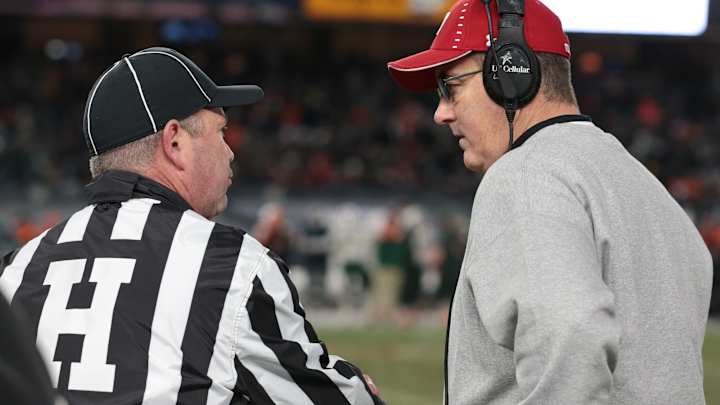Wisconsin football: Impact of the 2022 college football rule changes

In this story:
Each year the NCAA enacts several rule changes for college football, both on and off the field.
Lost in the shuffle of spring football, the recruiting calendar, and NIL news, the Football Rules Committee, chaired by Stanford head coach David Shaw, announced a handful of new rules that will go into effect for the 2022 college football season.
Let's take a look at some of the new rule changes and how they might impact the Wisconsin Badgers next fall.
Defensive holding
A minor update came to the defensive holding penalty. While the infraction remains a 10-yard penalty, it will also carry an automatic first down.
This measure will mark a much stiffer penalty, especially in third and long situations where holding calls frequently can happen.
With how often Jim Leonhard and the Wisconsin defense use man-to-man coverage, this slight adjustment to the rule could have a significant impact.
A key example from last season where the rule would have benefitted the Badgers happened last November against Minnesota. With Wisconsin driving early in the second quarter, the Gophers were flagged for a defensive holding penalty on a Graham Mertz sack. The call did not result in a first down. Instead, the drive stalled out moments later as they could not reach the first down and had to settle for a field goal.
This was called targeting on Wisconsin’s Eric Burrell pic.twitter.com/EjrMVKbvBV
— Joseph Hoyt (@JoeJHoyt) September 21, 2019
Targeting
Targeting has been one of the more contentious rules since its inception, but the NCAA is now allowing an appeal process for infractions that occurred in the second half of the game.
If a conference or school wins the appeal process, the athlete would be immediately eligible for competition at the start of the next game instead of forcibly sitting out the first half of the next contest, as the rule previously stated.
This policy adjustment does not represent the wholesale changes that many had hoped for with the targeting rule, but it is a step toward allowing players to return quicker and further review targeting calls.
One example from 2019 was a targeting call on Wisconsin safety Eric Burrell in the second half against Michigan. Burrell left the game on a targeting call for helmet-to-helmet contact during an awkward slide by Michigan quarterback Dylan McCaffrey.
Fellow Wisconsin safety Reggie Pearson would later be ejected for targeting against McCaffrey as well, and as a result, the Badgers were without both players in the first half against Northwestern the following week.
While Pearson's hit was rather egregious and fit the rule's standards perfectly, Burrell might have had a chance to appeal his hit and play if the NCAA national coordinator of officials overturned the ruling.
Injury timeouts
During the 2021 college football season, there were multiple instances where teams were critical of injury timeouts, claiming that defensive opponents were faking injuries to stop the game.
This phenomenon has gained traction the past decade with no-huddle and up-tempo offenses, and the NCAA will now allow schools to report questionable scenarios for review. Conferences would then be able to apply a punishment based on the results of the investigation.
Considering the pro-style offense that Wisconsin uses, this has not been as frequent of an occurrence as it has elsewhere.
Below the waist blocking
The NCAA simplified the rules surrounding below the waist blocking this off-season as well.
The new language allows only lineman and "stationary backs" inside the tackle box to go below the waist. Anything outside the tackle box, including down the field, will result in a penalty.
This rule should help reduce knee injuries for Wisconsin and their opponents.
KENNY PICKETT FAKED THE SLIDE AND RAN 58 YARDS FOR THE TD 😱 pic.twitter.com/EypNNJZYHE
— SportsCenter (@SportsCenter) December 5, 2021
Feet first slides
The last addition to the rulebook has been unofficially dubbed the Kenny Pickett rule.
The rule states that if a runner simulates a feet-first slide, the player is down immediate at that spot.
Pittsburgh quarterback Kenny Pickett faked a slide attempt during the middle of a scamper last winter against Wake Forest on a long touchdown run.
The move confused the defensive players and referees, and it brought about conversations about the new rule in the first place.
You can read the official press briefing here.
Related links:
You can keep up to date on everything at All Badgers by liking + following our Facebook page and Twitter account:
Facebook - @AllBadgersSI
Twitter - @SI_AllBadgers
You can also follow Site Publisher Matt Belz at @savedbythebelz on Twitter.

Title: Publisher, Beat Writer for AllBadgers.com, a Sports Illustrated Channel Hello, my name is Matt Belz, and I am the site manager at All Badgers. I previously wrote for multiple years at Buckeyes 5th Quarter and have been the leading publisher here since March of 2022. When I am not covering the Wisconsin Badgers football and men's basketball teams, I enjoy being outside and spending time with family and friends. You can follow everything I write about on several different platforms. First and foremost on our site...AllBadgers.com You can follow me personally on Twitter at @savedbythebelz or check out our Facebook page at Wisconsin FanNation on Sports Illustrated.
Follow @savedbythebelz